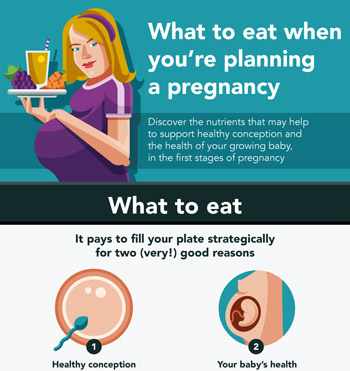It pays to fill your plate strategically for two (very!) good reasons
1. Healthy conception
Tweaking your diet won’t guarantee conception, but recent research suggests that specific nutrients (and making sure you’re getting enough of them) can have a positive effect for women and men when you’re trying to conceive.
See infographic below

2. Your baby’s health
A few key nutrients play a vital role in baby’s growth and development during pregnancy, and guidelines recommend topping up your levels of specific nutrients at least a month before conception.
5 nutrients to support healthy conception
Zinc -
Human eggs store and distribute zinc, a process that helps to control the conception and development of a healthy embryo. Good sources of zinc include beef, pumpkin seeds and legumes.
Vitamin B12 - B vitamins play a role in the production of energy and support normal conception and B12 is also needed to help folate work properly. Find it in milk (1 µg per glass), beef (1.3mcg per 85g) and yoghurt (1.5mcg per cup). You need 2.6mcg of B12 per day.
Omega-3 fatty acids - Another nutrient that may support healthy conception, marine-based omega-3s are found in abundance in seafood like canned sardines (1500 mg of omega-3s per 150g serve), Atlantic salmon (>500mg per 150g) and prawns (<300mg per 0g).
Good sources of plant-based omega-3s include walnuts (1.8g per 30g serve), chia seeds (2.6g per 15g) and soy and linseed bread (2.4g in two slices ). Aim to consume between 250-500 mg of marine-based omega-3s, and one gram of plant-sourced omega-3s , daily.
Vitamin C - Not only do developing eggs need sufficient vitamin C to mature, adequate levels may help stimulate normal ovulation. Good sources include red capsicum (95 mg per ½ cup), oranges (70 mg in one medium) and broccoli (51 mg per ½ cup).
Antioxidants - Antioxidants are important for women attempting conception. Chances of conception increase in women with higher levels of antioxidants in the fluid surrounding their reproductive organs.
Fruit and vegetables are the richest source of antioxidants, but nuts, wholegrains and seafood also contain significant amounts of specific antioxidants, such as vitamin E, selenium and manganese.
